Tagged: freelance
How to Work From Home & Not Go Crazy
- by Alyson Shane
Last week, after nearly 6 months of working from home, it finally happened: I got lonely. Not just any kind of lonely, though, this was "it's Tuesday and I haven't left the house or talked to the outside world since Sunday" kind of lonely. I started to feel anxious, crazy, and totally disconnected from the outside world.
As someone who has worked in an office for the majority of their adult life, working from home has taken some getting used to. Don't get me wrong, the perks are endless: I can wake up when I want, I can go for lunch or coffee with a colleague and not worry about being back "in time", and I can plan my workdays around when I'm my most productive and not when a boss expects me to be.
However, it does get super lonely. Hanging around the house all day with these two weirdos is awesome, but it's weird how much you begin to miss that water cooler chit-chat, and how much effort actually has to go into making sure you don't drive yourself stir-crazy.
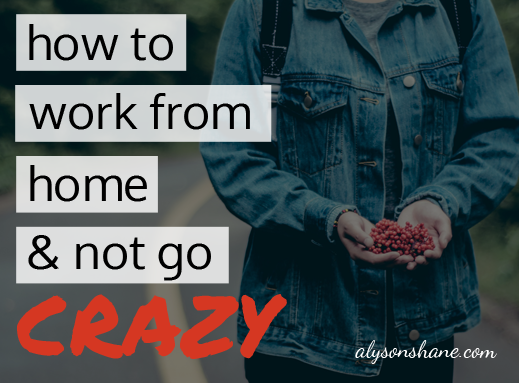
Get Dressed
Getting dressed is the difference between a "lazy Saturday in front of my laptop" and "I'm getting actual work done" mode. it might sound crazy, but stick with me here, there's some important reasons why this is actually a helpful and totally legitimate practice:
Clothes are symbolic, and affect how we feel about ourselves. When you put in the time to make yourself look nice you're more motivated to "get out there" and hustle, whether that means meeting a client, going somewhere, or even talking on the phone. In addition to that, getting dressed helps subconsciously compartmentalize areas of your life that can begin to blend together when you work from home.
Besides the mental difference between hanging out in your PJs and getting dressed, being fully dressed and ready to head out the door means that you can do exactly that - I can pop out to the store, to grab a coffee, or to go sit somewhere and work if I feel like it.
Personal aside: I have "power lipstick" that I put on before an important client call. I know it's silly, but wearing it makes me feel like a bombshell badass à la Meryl Streep in The Devil Wears Prada and definitely makes me feel more powerful and assertive.
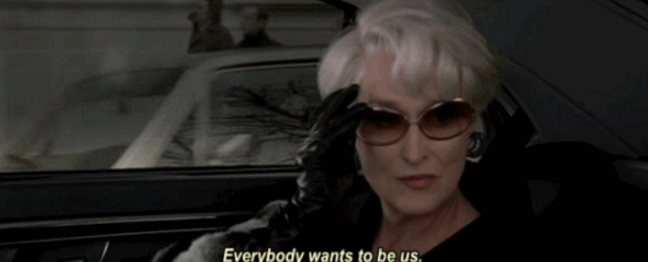
Keep Your Work Area Separate
Disengaging from work mode into relaxing mode is way harder when you do both in the same space.
Currently I do all of my "office" work at my iMac, at a desk, in a computer chair, and try to relegate "downtime" (aka hanging out on social networks, reading for leisure, and writing) to sitting on the couch with my Macbook. Sometimes these lines blur - I'll work on my eBook from the couch, or write a blog post at my desk (like I'm doing now) by and large my 9-5 type work takes place at a separate area than my leisure time.
My guess is that it's a mental thing, but sitting on my super-comfortable couch with my feet up makes me feel less like I'm working... so I work less. I spend way more time slacking off if I try to work from the couch than if I'm art my desk. Additionally, I can "leave work" for the day by putting my iMac to sleep and shutting off my desk lamp - those are symbolic gestures that, for me, signal the end of my workday and a transition to hanging out and relaxing.
Figure Out When You're Most Productive
One of the biggest changes from going to working in an office to working at home is that you don't have to worry about being "on" all the time. What I mean by that is, you don't have to worry about looking busy 24/7 just in case your boss happens to walk by and see your screen. According to a salary.com article from 2014, 89% of employees say they "waste time" at work - whether that's checking their email, hanging out on Facebook, or loitering around the coffee machine; they're not sitting at their desks and being productive.
But what does "productivity" mean? For most employers, it means that you're plugging away at a task and that you're operating at the highest efficiency levels from the moment you arrive to the moment you leave the office. Realtalk: this just isn't the reality, and sitting at your desk and forcing yourself to try and operate at maximum efficiency all day is a surefire way to get next to nothing done.
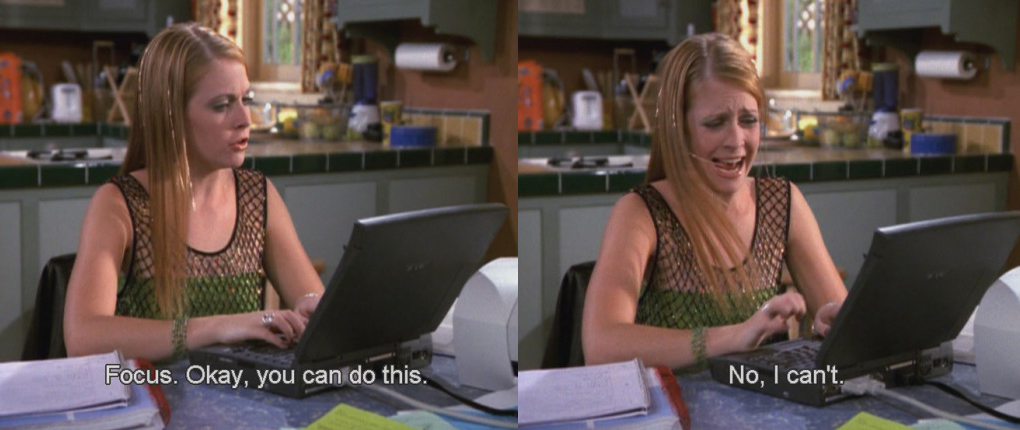
One of the great things about working from home is that you can set your own schedule according to when you're most productive, rather than trying to be productive all day (which rarely happens with any real level of consistency - we all need breaks, after all).
I know that I'm most productive early in the morning (8-11ish) and late in the afternoon (3-6ish), with a lull in-between most days, so I tackle my most pressing and important tasks during those two times - usually I try to handle client stuff in the AM, and do business development stuff (blogging, writing my ebook, etc) in the afternoon. That way I know I can get the most out of my day, and by having a little downtime I can make sure when I'm productive I'm as focused as possible.
Declutter Your Desk
Clutter is the enemy of productivity, and if you have to spend a ton of time searching through papers, looking for a pen that works, or rooting through old notes and files you're distracting yourself from what you should actually be focusing on: being productive.
I'm a bit of a cleanliness nut, so here's how I keep my desk organized and in a state of zen during the week:
- I only use one pen at a time. Actually, I rely pretty heavily on mechanical pencils, but I have a little box that I got from Magic Pony several years ago where all my pens and pencils live.
- Do a paper purge. I try to keep my desk as paper-free as possible, which means rounding up notes, papers, and receipts and putting them away. Additionally, if you want to claim something on a receipt as a business expense take a photo before you put it away. I do this weekly and it saves me so much hassle.
- Purge your desktop. Put unused files or photos in the trash bin and try to keep your computer desktop as clutter-free as possible. I generally only have my notebook, a pencil, and my phone on my desk when I'm working.
Find Reasons to Leave the House
This is a huge one, kids. It's way too easy to wake up, work, hang out, go to sleep, wake up, work, hang out, go to sleep, wake up... you get my drift. Especially during the winter months when sitting outside on the deck isn't an option it can be all too easy to wind up staying inside for days at a time, ordering all your meals in from SkiptheDishes and being glued to the computer screen.
Personally, I combat this by hitting the gym on a regular basis, which gets me out of the house, on the bus, and interacting with other human beings 3-4 times a week. Usually I'll stop by the grocery store on the way home for a little more face time with people aren't my boyfriend or my roommate or his girlfriend.
Don't Work in Bed
This should be self-explanatory, but just in case: don't bring your work into the same place where you sleep and snuggle up with your lover.
Do you have any tips for staying sane while working from home? I'd love to hear them!
The Do's & Don'ts of "The Approach"
- by Alyson Shane

Recently I had an encounter which really bothered me: I was sent a very generic email from one of those "job board"-type websites; namely one where freelancers can post their profiles and bid on jobs posted by people looking for help.
Generally I don't use these websites, as aggressively bidding for a contract doesn't generally foster the kinds of trustworthy, friendly relationships that I want to establish with my clients (but that's just me). Either way, this wasn't what bothered me enough to write about it.
What set off red flags was that he mentioned seeing my profile on a content marketing website where I've never registered as an active user. I double-checked to make sure that there wasn't a fake Alyson Shane trolling around it's user base and, as I suspected, no such profile existed.
I have no idea why he decided to add this untrue statement to his email, but it definitely rubbed me the wrong way and I sent him a polite reply thanking him for his time and stating that I wasn't interested in using his job board at this time. End of story, right?
Or not.
A few days later I received another email, from someone at a different email address, asking me if I was looking to take on new freelance work. I always am (shameless plug, let's work together!) and I sent back a friendly reply asking about what sort of work he wanted to do together.
The reply I got was something like this:
"It's great that you're looking for new freelance work! Why don't you try posting on our job board at [website name here]?"
After some quick digging I realized that this was a different person associated with the same website that had sent me the weird, generic, obviously-not-researched at all email a few days prior.
This isn't the first time that I've encountered people who approach me this way, and I'm sure it won't be the last, but I wanted to make a quick list of Do's & Don'ts when approaching someone to give you their business, or to collaborate with you in some way, because these simple rules seem to elude some people:
Don't
Be shady. Like the example that I outlined at the beginning of this post, it's disrespectful to try and weasel someone into using your service or working on a project with you. Be honest.
Assume you know better. If someone declines to work with you, don't send a snarky reply insinuating that they will be doing their audience or reputation a disservice.
Leave a million messages. If you call and someone is unavailable, leave a short voice mail (or follow-up email) and wait a reasonable amount of time before calling again. 5-6 voice mails in the span of a few hours is unacceptable unless your house is on fire.
Expect people to work for free. Most of the time you can expect to pay for people's services and their time. There are some exceptions to this rule, but they are situational and can be negotiated in the moment. Don't reach out expecting for free work or promotions.
Do:
Do your homework. Read their blog, follow them on Twitter, add them on LinkedIn, whatever you feel is necessary to gain an understanding of who they are and what they do.
Be professional. See above. It's not okay to send nasty emails to people just because they didn't give you the response that you were looking for.
Be Clear. People can't help you solve your problems if you can't articulate them. Skip emails full of buzzwords and get straight to who you are, what you do, and what you need.
Be Available. If you've scheduled a specific time to have a phone call or Skype meeting, give some notice if you will be unavailable and, if you can reschedule, make a point to be available at that time. Other people's time is as important as yours, so try to be available when you say you will.
Email whenever possible. This is more of a personal preference, but personally I find that sending an email (or filling out a contact form) is much more respectful of my time and allows me the opportunity to do a bit of research before responding. This way I can be prepared.
See? It's easy! By following some simple rules we can make every interaction a much more respectful and pleasant one!
Do you have Do's or Don'ts to add to this list? I'd love to hear them!
Making the Case Against Multitasking
- by Alyson Shane
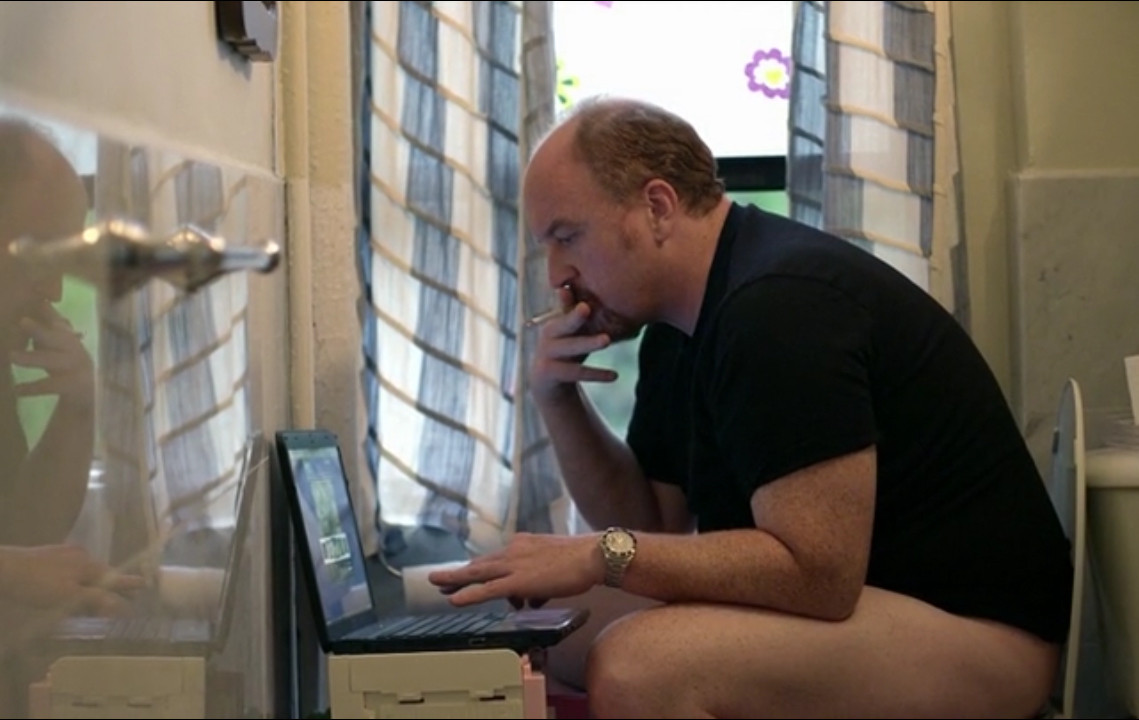
My 9-5 is a great example of how to get nothing done. I'm the Marketing Manager for two RE/MAX agents and I can't count the amount of times that I've sat down with every intention of getting a ton of work done... only to find that four hours have passed, I've answered the phone fifteen times, and I'm nowhere on my project.
This is magnified when I sit down to do any of my freelance work, because having all of those other tabs is sooooo tempting and I'm not only managing my own creative projects, networking, planning and administrative, but someone else's, too! It's so tempting and easy to get sucked in to doing something, anything other than what I'm doing. But, every time I switch to a new task my brain has to engage, disengage and reengage somewhere else and I lose precious work time that I could be spending
As such, I've had it with trying to multitask.
Sure, we might feel productive while simultaneously checking our email, social media feeds, taking phone calls, writing, etc, but what we're actually doing is diving up our attention and energy and actually half-assing all of it instead of being really, really good at one of those things, and studies show that a person who is interrupted takes 50 percent longer to accomplish a task. Not only that, we can make up to 50 percent more errors.
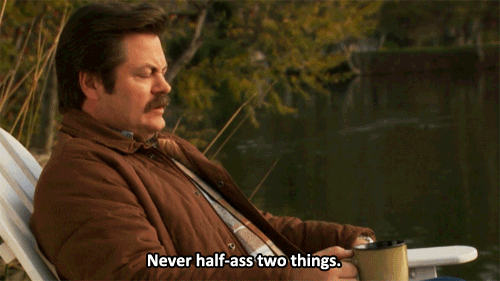
Here's what I do to stay focused and fight the urge to multitask:
Work uninterrupted for designated periods of time. I plug in headphones so there are no external distractions and put my head down and just get through it. Hours will pass in the blink of an eye and my productivity skyrockets.
Set alarms for checking emails & alerts. Especially when I'm waiting to hear back from a client, or working on a social media project. I can't ignore them.
Put my phone face-down. Usually I put it to my side, or underneath something, as the little alerts drive me batty and fill me with that "must respond now!" urge. Some people recommend putting your phone in another room, but honestly I'm way too attached to mine to ever do that. Plus I like it's pretty Dalek case.
Stretch. I find my attention starts slipping if I start getting uncomfortable; it's kind of like my mind is trying to convince me to continue to sit still by going "oh hey, check out what's happening on Twitter!" If I find myself slipping into this mindset I'll get up (without checking my phone!) and do a standing torso twist stretch (this also cracks my back, which feels amazing. Don't judge!).
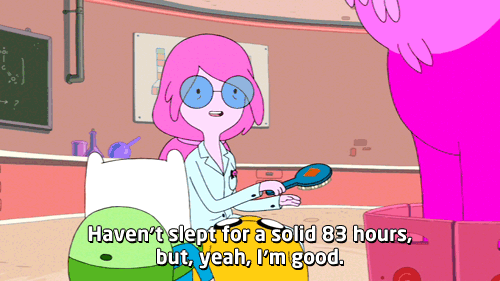
Get some damn sleep. I'm terrible for this. I'll work until well into the night without realizing it; or, I'll realize that it's 11:45pm and think "just a little more work" and then it's almost 1am. It doesn't help that I happen to date a workaholic who is just as bad as I am, but we're both slowly trying to form habits that make us more productive overall, not just when it's crunch-time.
Cut back on caffeine when I'm working. This is the hardest of all. I love coffee and my 9-5 is conveniently located near Little Sister and Thom Bargen (my favourite haunt) is a short walk from my house. Not only does caffeine consumption mess up your sleep patterns (see above, we already know this is an issue for me) but that little kick-start to my heart that a cup of strong coffee frequently is counter-productive because my mind starts racing too much to focus on a single project.
The moral of the story is this: we didn't evolve to live our lives this way, looking at a million things a minute. We walked long ways and focused on singular activities, so it's important to be mindful of the ways that our contemporary lifestyles go against what's natural, and how we can curb those behaviours to actually be productive and happy.
Do you have any tips for staying focused? I'd love to hear them!
